
1908: From a Daily Telegraph interview with Kaiser Wilhelm II:
Germany is a young and growing empire. She has a world-wide commerce which is rapidly expanding and to which the legitimate ambition of patriotic Germans refuses to assign any bounds. Germany must have a powerful fleet to protect that commerce and her manifold interests in even the most distant seas. She expects those interests to go on growing, and she must be able to champion them manfully in any quarter of the globe. Her horizons stretch far away. She must be prepared for any eventualities in the Far East.
Who can foresee what may take place in the Pacific in the days to come, days not so distant as some believe, but days at any rate, for which all European powers with Far Eastern interests ought steadily to prepare? Look at the accomplished rise of Japan; think of the possible national awakening of China; and then judge of the vast problems of the Pacific. Only those powers that have great navies will be listened to with respect when the future of the Pacific comes to be solved; and if for that reason only, Germany must have a powerful fleet. It may even be that England herself will be glad that Germany has a fleet when they speak together on the same side in the great debates of the future.
1914 Various:

1914 List Regiment (Oct 24 - 26): Elements of Infantry Recruit Adolf Hitler's 1st Company, 16th Bavarian Reserve Infantry, shoot at an aircraft, and miss. Just as well, as it turns out to be a German plane. Father Norbert reports that the regiment is surrounded by spies:
Because the enemy received intelligence from the church tower, through signs and the chiming of the hour and the direction of the hand, the clergymen were arrested and were not allowed to enter the rectory again . . . . My accoutrements—or monk's habit—excited everywhere a great commotion amongst friends and foe alike. I was even to be arrested as a spy, as a result of my dress. For five hours I was closely watched by a constable and 15 men, until the mistake was cleared up. [For further details, Click here.]

From Adolf Hitler's Hepp Letter:
Early, around 6 am, we came to an inn. We were with another company and it was not till 7 am that we went out to join the dance. We followed the road into a wood, and then we came out in correct marching order on a large meadow. In front of us were guns in partially dug trenches and, behind these, we took up our positions in big hollows scooped out of the earth; and waited. Soon, the first lots of shrapnel came over, bursting in the woods, and smashing up the trees as though they were brushwood. We looked on interestedly, without any real idea of danger. No one was afraid. Every man waited impatiently for the command: "Forward!" The whole thing was getting hotter and hotter. We heard that some of us had been wounded. Five or six men brown as clay were being led along from the left, and we all broke into a cheer: six Englishmen with a machine gun! We shouted to our men marching proudly behind their prisoners. The rest of us just waited. We could scarcely see into the steaming, seething witches' caldron, [that] lay in front of us. At last there came the ringing command: "Forward!"
We swarmed out of our positions and raced across the fields to a small farm. Shrapnel was bursting left and right of us, and the English bullets came whistling through the shrapnel; but we paid no attention to them. For ten minutes, we lay there; and then, once again, we were ordered to advance. I was right out in front, ahead of everyone in my platoon. Platoon-leader Stoever was hit. Good God! I had barely any time to think; the fighting was beginning in earnest! Because we were out in the open, we had to advance quickly. The captain was at the head. The first of our men had begun to fall. The English had set up machine guns. We threw ourselves down and crawled slowly along a ditch. From time to time someone was hit, we could not go on, and the whole company was stuck there. We had to lift the man out of the ditch. We kept on crawling until the ditch came to an end, and then we were out in the open field again. We ran fifteen or twenty yards, and then we found a big pool of water. One after another, we splashed through it, took cover, and caught our breath. But it was no place for lying low. We dashed out again at full speed into a forest that lay about a hundred yards ahead of us. There, after a while, we all found each other. But the forest was beginning to look terribly thin.

At this time there was only a second sergeant in command, a big tall splendid fellow called Schmidt. We crawled on our bellies to the edge of the forest, while the shells came whistling and whining above us; tearing tree trunks and branches to shreds. Then the shells came down again on the edge of the forest, flinging up clouds of earth, stones, and roots; and enveloping everything in a disgusting, sickening, yellowy-green vapor. We can't possibly lie here forever, we thought and, if we are going to be killed, it is better to die in the open. Then the Major came up. Once more we advanced. I jumped up and ran as fast as I could across meadows and beet fields, jumping over trenches, hedgerows, and barbed-wire entanglements; and then I heard someone shouting ahead of me: "In here! Everyone in here!" There was a long trench in front of me and, in an instant, I had jumped into it; and there were others in front of me, behind me, and left and right of me. Next to me were Württembergers, and under me were dead and wounded Englishmen.
The Württembergers had stormed the trench before us. Now I knew why I had landed so softly when I jumped in. About 250 yards to the left there were more English trenches; to the right the road to Leceloire was still in our possession. An unending storm of iron came screaming over our trench. At last, at ten o'clock, our artillery opened up in this sector. One—two—three—five—and so it went on. Time and again a shell burst in the English trenches in front of us. The poor devils came swarming out like ants from an ant heap, and we hurled ourselves at them. In a flash we had crossed the fields in front of us, and after bloody hand-to-hand fighting in some places, we threw [the enemy] out of one trench after another. Most of them raised their hands above their heads. Anyone who refused to surrender was mown down. In this way we cleared trench after trench.
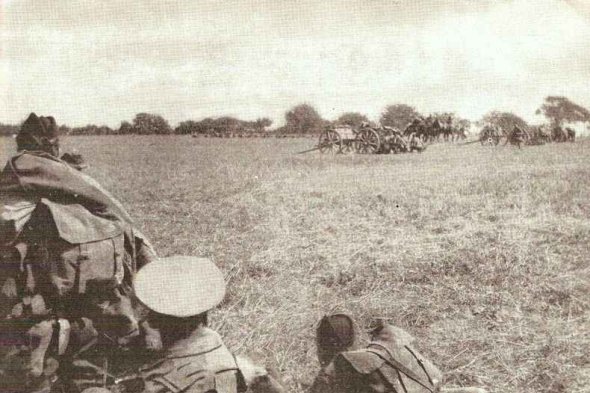
At last we reached the main highway. To the right and left of us there was a small forest, and we drove right into it. We threw them all out of this forest, and then we reached the place where the forest came to an end and the open road continued. On the left lay several farms—all occupied—and there was withering fire. Right in front of us, men were falling. Our Major came up; quite fearless, and smoking calmly; with his adjutant, Lieutenant Piloty. The Major saw the situation at a glance, and ordered us to assemble, on both sides of the highway for an assault. We had lost our officers, and there were hardly any noncommissioned officers. So all of us, every one of us who was still walking, went running back to get reinforcements. When I returned the second time with a handful of stray Württembergers, the Major was lying on the ground with his chest torn open, and there was a heap of corpses all around him.
By this time, the only remaining officer was his adjutant. We were absolutely furious. "Herr Leutnant, lead us against them!" we all shouted. So we advanced straight into the forest, fanning out to the left, because there was no way of advancing along the road. Four times we went forward, and each time we were forced to retreat. From my company, only one other man was left besides myself, and then he, too, fell. A shot tore off the entire left sleeve of my tunic but, by a miracle, I remained unharmed. Finally, at 2 am we advanced for the fifth time; and this time, we were able to occupy the farm and the edge of the forest. At 5 pm, we assembled and dug in, a hundred yards from the road.
The Emden arrived at Penang in the early morning of October 28 and using her false fourth funnel and flying the white Ensign slipped past the harbour pilot into the harbor. There was concern that there may be two French armoured cruisers in port but the only warship they sighted was the Russian light cruiser Zhemchug.
At 0518 Emden raised the German Ensign and at 400 yards launched a torpedo which hit aft of the second funnel, the explosion lifting the stern of the ship out of the water. Emden opened fire with her 4.1 inch guns then turned to port to bring her other torpedo tube to bear. Zhemchug returned fire with her remaining 4.7 inch guns but scored no hits.
At 0528 Emden fired her port torpedo at 800 yards, hitting Zhemchug near the bridge and breaking the Russian cruiser in half. Emden sprinted for the harbour exit and saw an unidentified vessel which she opened fire on. Emden immediately ceased fire, and later apologised, when it was realised that the vessel was an unarmed patrol vessel. Soon after Glenturret, a merchant ship carrying explosives, was sighted and boarded (still inside the harbour) but almost immediately the boarding party had to be recalled as the French destroyer Mousquet was sighted. Emden opened fire as the French ship tried to turn and run.

1915 World War I (Oct 4, 1915 - Feb 29, 1916): Gefreiter Adolf Hitler's serves with 16 Reserve Infantry Regiment at Fromelles. [For further details, Click here.]
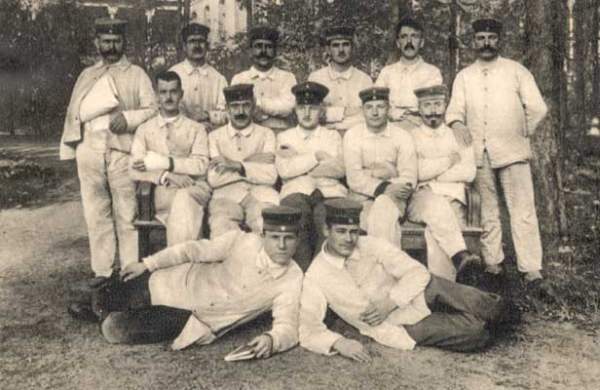
1916 Death: Oswald Boelcke: German flying ace of the First World War and one of the most influential patrol leaders and tacticians of the early years of air combat. Boelcke is considered the father of the German fighter air force; he was the first to formalise the rules of air fighting, which he presented as the Dicta Boelcke. Germany's premier ace, Manfred von Richthofen (The Red Baron), had been taught by Boelcke and continued to idolize his late mentor long after he had surpassed Boelcke's tally of victories.
1917 Various:
World War I: Luigi Cadorna on the Battle of Caporetto:A violent attack and the feeble resistance of detachments of the Second Army permitted Austro-German forces to pierce our left wing on the Julian front. The valiant efforts of other troops were not successful in preventing the enemy from penetrating to the sacred soil of our Fatherland. The bravery displayed by our soldiers in so many memorable battles fought and won in the past two and a half years gives our Supreme Command a pledge that this time, too, the army to which the honour and safety of the country are entrusted will know how to fulfil its duty." [For the account by Von Cramon on the Battle of Caporetto click here.]
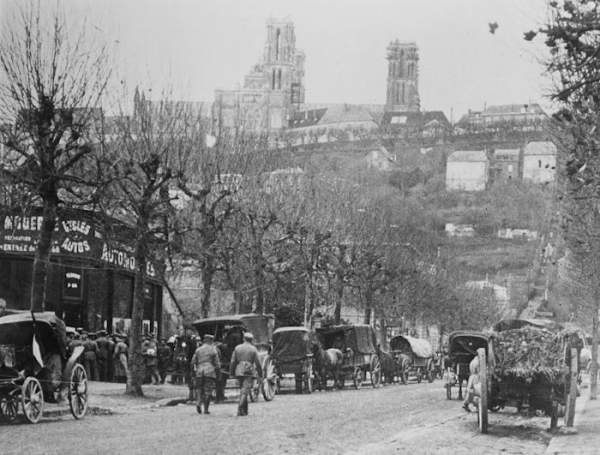
1918 World War I: Various:
German sailors begin to mutiny:
On this day in 1918, sailors in the German High Seas Fleet steadfastly refuse to obey an order from the German Admiralty to go to sea to launch one final attack on the mighty British navy, echoing the frustrated, despondent mood of many on the side of the Central Powers during the last days of World War I.
By the last week of October 1918, three of the Central Powers-Germany, Austria-Hungary and the Ottoman Empire-were at least in talks with the Allies about reaching an armistice, while the fourth, Bulgaria, had already concluded one at the end of September. With the end of the war seemingly in sight, the German naval command-led by the Admiralty's chief of staff, Reinhardt Scheer-decided to launch a last-ditch effort against the British in the North Sea in a desperate attempt to restore the German navy's prestige. In the words of Reinhardt Scheer, chief of staff of the German Admiralty, "An honorable battle by the fleet-even if it should be a fight to the death-will sow the seed of a new German fleet of the future. There can be no future for a fleet fettered by a dishonorable peace." Choosing not to inform the chancellor, Max von Baden, of its plans, the German Admiralty issued the order to leave port on October 28.
The sailors themselves, however, believing the attack to be a suicide mission, would have none of it. Though the order was given five times, each time they resisted. In total, 1,000 mutineers were arrested, leaving the Imperial Fleet immobilized. By October 30, the resistance had engulfed the German naval base at Kiel, where sailors and industrial workers alike took part in the rebellion; within a week, it had spread across the country, with revolts in Hamburg, Bremen and Lubeck on November 4 and 5 and in Munich two days later. This widespread discontent led Socialist members of the German Reichstag, or parliament, to declare the country a republic on November 9, followed swiftly by Kaiser Wilhelm's abdication and finally, on November 11, by the end of the First World War. (History.com)
Kaiser Wilhelm II's Proclamation to Chancellor Prince Max von Baden:
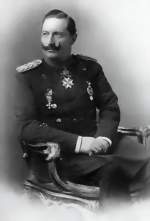
Your Grand Ducal Highness: I return herewith for immediate publication the bill to amend the Imperial Constitution and the law of March 17, 1870, relative to the representation of the Imperial Chancellor, which has been laid before me for signature. On the occasion of this step, which is so momentous for the future history of the German people, I have a desire to give expression to my feelings. Prepared for by a series of Government acts, a new order comes into force which transfers the fundamental rights of the Kaiser's person to the people.
Thus comes to a close a period which will stand in honour before the eyes of future generations. Despite all struggles between invested authority and aspiring forces, it has rendered possible to our people that tremendous development which imperishably revealed itself in the wonderful achievements of this war. In the terrible storms of the four years of war, however, old forms have been broken up, not to leave their ruins behind but to make a place for new, vital forms. After the achievements of these times, the German people can claim that no right which may guarantee a free and happy future shall be withheld from them.
The proposals of the Allied Governments which are now adopted and extended owe their origin to this conviction. I, however, with my exalted allies, endorse these decisions of Parliament in firm determination, so far as I am concerned, to cooperate in their full development, convinced that I am thereby promoting the weal of the German people. The Kaiser's office is one of service to the people. May, then, the new order release all the good powers which our people need in order to support the trials which are hanging over the empire and with a firm step win a bright future from the gloom of the present.
Italy: British and French troops gain a large bridgehead on the Piave River, splitting the front.
Czechoslovakia gains independence as Austria-Hungary breaks up.
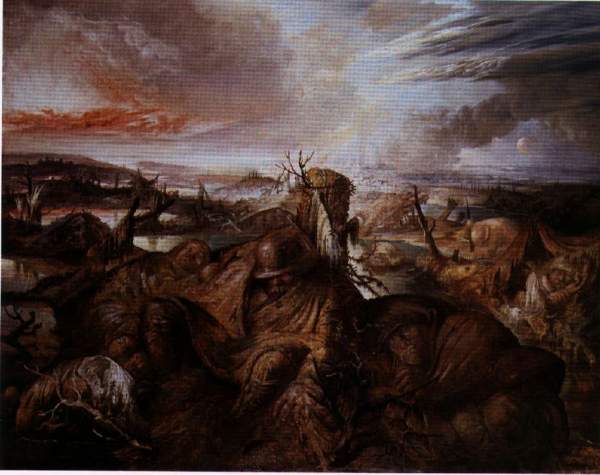
World War I (Oct 15 - Nov 10): Gefreiter Adolf Hitler, blinded in a gas attack near Werwick on Oct 14, recovers in the Prussian Reserve Hospital at Pasewalk near Berlin. The doctors at this army hospital, on the cutting edge of medical treatments for gassed soldiers, provide Hitler with very good care, and his sight slowly and painfully begins to return to him over these few weeks. Hitler falls into a deep depression. After over four years on the front lines, his fighting days are over. In four years of war, the List Regiment has lost 3,754 dead, 8,795 wounded, with 678 taken prisoner. This is somewhat above the average for the German Armed Forces as a whole.
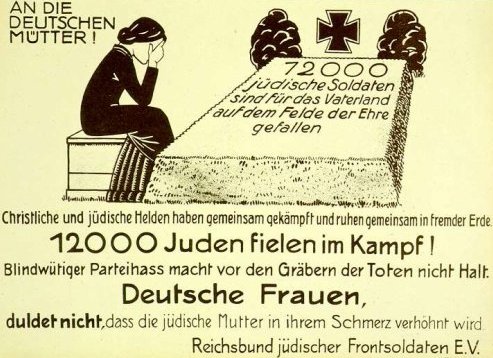
Throughout the length of the war, fifty-nine Jews served in the List Regiment, sixteen of these as officers. Thirty percent of the Jews in the List Regiment were honored for bravery, and seventeen percent were killed in action.[For further details, Click here.]
1922 Italy: Mussolini comes to power:
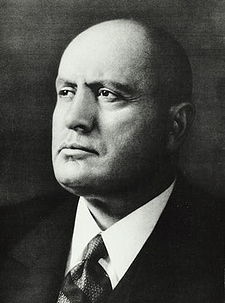
Known as "Il Duce"—the Leader—Mussolini was the Fascist dictator of Italy during World War II. Mussolini grew active in Italian politics in the first decade of the 1900s. He then spent time in exile in Switzerland and Austria, where he worked writing and editing socialist newspapers. He returned to Italy after serving in World War I and gained power and notoriety as a revolutionary nationalist. He founded the Fascist Party in 1919, used force and intimidation against political opponents and took power in 1922. Nicknamed Il Duce, Mussolini created a dictatorship and dissolved the parliament.
1924 Following the British example of February 1, the French extend de jure recognition of the USSR. Romania and Yugoslavia refuse.
1933 Holocaust: Various:Austria: Gustav Ranzenhoffer, Austrian High Court Justice, demands a numerus clausus for Jews in all professions.
Palestine: The Nazis boast that their anti-Semitic propaganda has inspired Arab riots. (THP)
1934 Palestine: The Arab Federation of Labor calls for a Jewish boycott.
1937 Spanish Civil War: The Spanish Loyalists (Socialists) government escapes to Barcelona.
1938 Holocaust: Oct 28-29 Some 15,000 "stateless" Jews are forced to leave their homes throughout Germany and to go, with only one suitcase, to the nearest railway station. They are then taken through the night to the German-Polish border and forced across at gun point. (THP)
1939 Various:
Holocaust: Starting with the town of Piotrkow, German authorities begin confining the Jews of Poland to a particular area (ghetto) of each city or town in which they live. Sometimes this area is the already prominently Jewish quarter, but often it is a poor or neglected part of the town, away from the center. Jews from the rest of the town are then forced to leave their homes, and to move into this, often much smaller area, in which even the basic amenities are unavailable. In each of these ghetto areas, food and medical supplies are restricted. Intense overcrowding, hunger and disease lead to widespread suffering and death. (THP)
Voelkishness: Himmler sets off a controversy when he issues an extraordinary "order" for the entire SS and police to father as many children as possible, even outside of marriage, to compensate for the German blood lost in the war. Himmler pledges to provide generous support for all such children, regardless of their parents' marital status. (THP)
1940 World War II: Various:
Italy invades Greece:
On this day in 1940, Mussolini's army, already occupying Albania, invades Greece in what will prove to be a disastrous military campaign for the Duce's forces.
Mussolini surprised everyone with this move against Greece; even his ally, Adolf Hitler, was caught off-guard, especially since the Duce had led Hitler to believe he had no such intention. Hitler denounced the move as a major strategic blunder. According to Hitler, Mussolini should have concentrated on North Africa, continuing the advance into Egypt. Even Mussolini's own chief of army staff found out about the invasion only after the fact. But despite being warned off an invasion of Greece by his own generals, despite the lack of preparedness on the part of his military, despite that it would mean getting bogged down in a mountainous country during the rainy season against an army willing to fight tooth and nail to defend its autonomy, Mussolini moved ahead out of sheer hubris, convinced he could defeat the Greeks in a matter of days. He also knew a secret, that millions of lire had been put aside to bribe Greek politicians and generals not to resist the Italian invasion.
Whether the money ever made it past the Italian fascist agents delegated with the responsibility is unclear; if it did, it clearly made no difference whatsoever-the Greeks succeeded in pushing the Italian invaders back into Albania after just one week, and the Axis power spent the next three months fighting for its life in a defensive battle. To make matters worse, virtually half the Italian fleet at Taranto had been crippled by a British carrier-based attack. Mussolini had been humiliated. (History.com)
Holocaust: A second escape from Auschwitz results in a roll-call from 12 noon to 9PM in bitter weather, during which 200 prisoners die. (THP)
Holocaust: Himmler inspects Gross-Rosen concentration camp in Silesia. (THP)
1941 World War II: Various:
President Roosevelt approves the appropriation by Congress of an additional $6 billion in Lend-Lease aid to Britain and the Soviet Union.
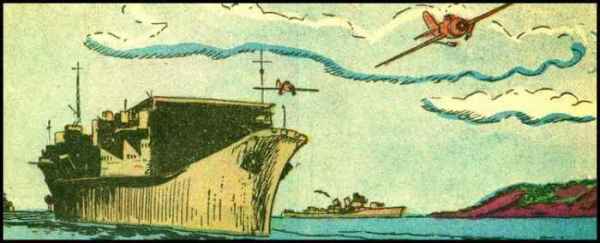
From the Duty Book of Captain Shigeshi Uchida:
The national policy has not yet been decided. The Emperor ordered a study of the present situation from the very beginning, cleaning the slate. (The shipping problem was thought to be the most serious question at that time.)
[See: Countdown to Infamy: Timeline to Pearl Harbor.]From a directive of the 8th Military District:
Re: Soviet Russian prisoners of war. The following arrangements were decided during a conference of the OKW: 1. Blankets. The Soviet Russians will receive paper blankets, which they will have to manufacture themselves, in the form of quilts, from paper tissue, filled with crumpled paper and similar material. The material will be procured by the OKW . . . . Burial of Soviet Russians: Soviet prisoners of war are to be buried naked, without a coffin, wrapped in packing paper. Coffins will be used only for transports. In the labor commands the burial will be attended to by the competent authorities. Burial expenses will be met by the competent M-Stalag for prisoners of war. The stripping of the bodies will be done by the camp guards. Signed: by order, Grossekettler.
Holocaust: Lithuania: In Kaunas, German SS arrange the massacre of more than 9,000 Jews of Kaunas ghetto. All Jews, men, women, children at 6 am, assembled on the big Demokratu square to be shot and buried later into the gigantic ditches.
1942 World War II: The US government orders the seizure of two Nazi front organizations run by Prescott Bush and Averell Harriman: The Holland-American Trading Company and the Seamless Steel Equipment Corporation. [For further details, Click here.]
1943 World War II: Various:
The Philadelphia Experiment supposedly occurs. It is also called Project Rainbow (a codename shared by an acknowledged radar stealth technology tested on the Lockheed U-2 (Sweetman 2001). No connection has been proved between these two projects). Every member of the ship's crew denies that any form of this event occurred, except for Al Bielek, who was nowhere near the ship on the date he claims to have witnessed the experiment. A number of people argue that the Philadelphia Experiment was genuine. The Philadelphia Experiment has caused a significent ripple effect on conspiracy theory, and elements of the Philadelphia Experiment feature in many other conspiracy tales. (THP)
Church and Reich: Ambassador Weizsacker reports:
Although under pressure from all sides, the Pope has not let himself be drawn into any demonstrative censure of the deportation of Jews from Rome. Although he must expect that his attitude will be criticized by our enemies and exploited by the Protestant and Anglo-Saxon countries in their propaganda against Catholicism, he has done everything he could in this delicate matter not to strain relations with the German government and German circles in Rome. As there is no reason to expect other German actions against the Jews of Rome, we can consider that a question so disturbing to German-Vatican relations has been liquidated. (THP)
1944 World War II: Various:
War against Japan: The first B-29 Superfortress bomber mission from the airfields in the Mariana Islands strike against the Japanese base at Truk.
Bulgaria: The government signs an armistice with the Soviet Union, Britain and the United States.
2005 Death: Eugene K. Bird: US Director of the Spandau prison from 1964 to 1972. For more than two decades, Bird guarded deputy Nazi Fuehrer Rudolf Hess. After Hess' death, Bird remained suspicious of the official account of suicide. "I was suspicious for several reasons," Bird told a Deutsche Presse-Agentur reporter. "After all, Hess who had been held in Spandau for almost 30 years was by then 93 years old and fragile. I doubted he had the strength to kill himself with a cord which was not attached at both ends to anything.
Edited by Levi Bookin (Copy editor)
levi.bookin@gmail.com



Click to join 3rdReichStudies



Disclaimer: This site includes diverse and controversial materials--such as excerpts from the writings of racists and anti-Semites--so that its readers can learn the nature and extent of hate and anti-Semitic discourse. It is our sincere belief that only the informed citizen can prevail over the ignorance of Racialist "thought." Far from approving these writings, this site condemns racism in all of its forms and manifestations.
Fair Use Notice: This site may contain copyrighted material the use of which has not always been specifically authorized by the copyright owner. We are making such material available in our efforts to advance understanding of historical, political, human rights, economic, democracy, scientific, environmental, and social justice issues, etc. We believe this constitutes a "fair use" of any such copyrighted material as provided for in section 107 of the US Copyright Law. In accordance with Title 17 U.S.C. Section 107, the material on this site is distributed without profit to those who have expressed a prior interest in receiving the included information for research and educational purposes. If you wish to use copyrighted material from this site for purposes of your own that go beyond 'fair use', you must obtain permission from the copyright owner.
Please Note: The list-owner and the moderator of 3rdReichStudies are not responsible for, and do not necessarily approve of, the random ads placed on our pages by our web server. They are the unfortunate price one pays for a 'free' website.